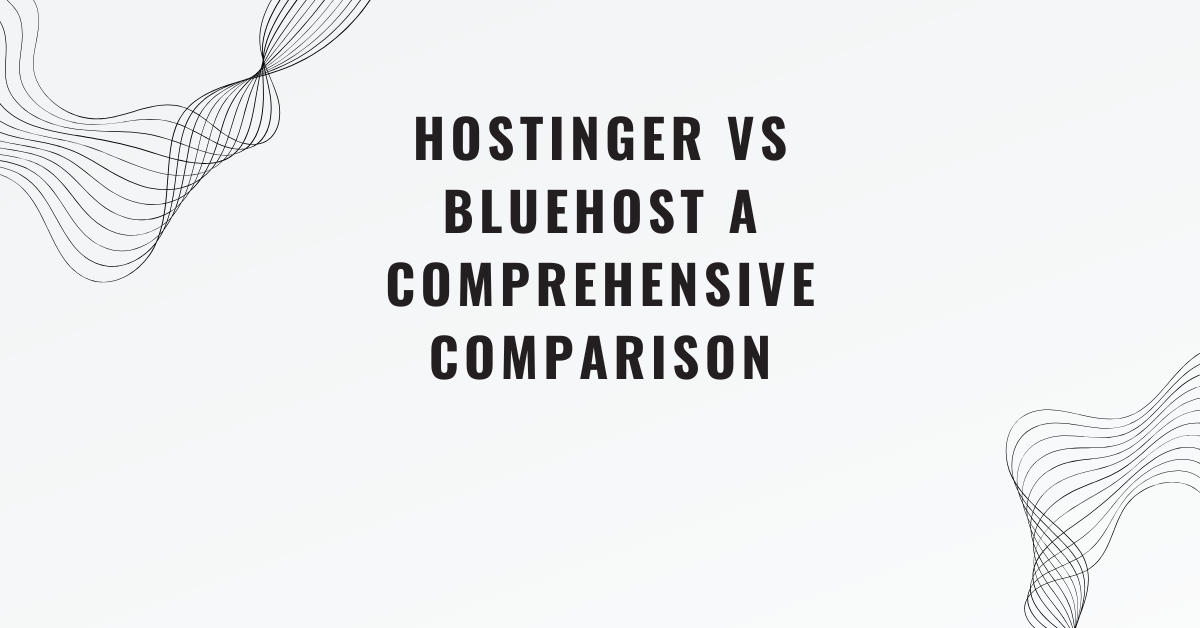Introduction
Choosing the right web hosting service is one of the most crucial decisions you’ll make when setting up a website. The hosting provider you select impacts your website’s performance, security, support, and overall user experience. Among the many hosting providers available today, Hostinger and Bluehost are two of the most popular options. Both have their strengths, and depending on your needs, one may be a better fit than the other. In this blog, we’ll compare Hostinger vs Bluehost across various key factors to help you make an informed decision.
Overview of Hostinger
Hostinger is known for its affordable hosting solutions, combined with fast performance and solid customer support. Established in 2004, the company has grown to host over 29 million users worldwide, offering a range of hosting options such as shared hosting, VPS hosting, cloud hosting, and WordPress hosting.
Overview of Bluehost
Bluehost, founded in 2003, is one of the largest and most popular hosting providers, with millions of websites hosted globally. Known for its excellent customer support and user-friendly interface, Bluehost is also recommended by WordPress itself. It offers various hosting solutions, including shared hosting, VPS hosting, dedicated hosting, and managed WordPress hosting.
1. Performance and Speed
Performance and website speed are critical factors when choosing a hosting provider. Slow websites lead to poor user experiences and can negatively affect search engine rankings.
Hostinger’s Performance
Hostinger is recognized for its impressive speed, thanks to its use of LiteSpeed technology, SSD storage, and caching features. On average, Hostinger’s page load times are among the fastest in the industry, making it an excellent choice for users who prioritize speed.
Bluehost’s Performance
Bluehost also offers solid performance, with a focus on SSD storage to ensure fast loading times. While Bluehost provides fast load times, it might not be as fast as Hostinger in certain regions. Nonetheless, Bluehost provides reliable uptime and overall stable performance.
Winner
Hostinger wins in terms of raw performance and speed, especially for those looking for ultra-fast load times.
2. Pricing
Pricing is often the most critical factor for small businesses or personal websites. Both Hostinger and Bluehost are known for their competitive pricing.
Hostinger Pricing
Hostinger offers extremely affordable plans, with their shared hosting plan starting as low as $1.99 per month. It’s one of the most budget-friendly hosting options available. Additionally, Hostinger frequently offers significant discounts, making it an attractive choice for those on a tight budget. However, the renewal prices are typically higher, so it’s essential to review the renewal rates before committing.
Bluehost Pricing
Bluehost offers a range of hosting plans, with shared hosting starting at $2.95 per month. While slightly higher than Hostinger’s starting price, Bluehost still offers great value for the services provided. Bluehost also offers frequent discounts, but like Hostinger, the renewal prices are higher than the introductory rates.
Winner
Hostinger edges out Bluehost with its more affordable introductory pricing.
3. User Interface and Ease of Use
A user-friendly interface makes it easier to manage your website and hosting account, especially for beginners.
Hostinger’s Interface
Hostinger features an intuitive custom control panel known as hPanel. While not as well-known as cPanel, Hostinger’s hPanel is easy to use and provides quick access to essential tools like email accounts, website builder, and domains. Beginners will appreciate its clean, easy-to-navigate interface, which simplifies the hosting experience.
Bluehost’s Interface
Bluehost uses the industry-standard cPanel for managing hosting accounts. While cPanel can be overwhelming for beginners due to the number of features and options, Bluehost has simplified it with its custom interface. The dashboard is user-friendly, and Bluehost also offers an easy website builder to help users quickly get started.
Winner
Bluehost is a slight winner here due to the familiarity and reliability of cPanel, even though Hostinger’s hPanel is also quite user-friendly.
4. Customer Support
Great customer support is essential, especially if you’re not tech-savvy or encounter issues with your hosting service.
Hostinger’s Support
Hostinger offers 24/7 customer support through live chat, email, and a knowledge base. They have a reputation for providing excellent support, with quick responses and helpful guidance. However, they do not offer phone support, which might be a drawback for some users.
Bluehost’s Support
Bluehost also offers 24/7 support through phone, live chat, and email. Their customer support is highly regarded, especially by WordPress users. Bluehost’s phone support gives it an edge over Hostinger for users who prefer talking to someone directly.
Winner
Bluehost wins for providing phone support, which some users may prefer.
5. Features
Both Hostinger and Bluehost offer a variety of hosting features, but the specific tools and technologies they offer can vary.
Hostinger Features
– Free Website Builder
Hostinger offers a free website builder with easy-to-use drag-and-drop functionality.
– Free SSL Certificate
An SSL certificate is included for all plans, providing secure connections for your website visitors.
– Free Domain
Hostinger offers a free domain for the first year on certain plans.
– Cloudflare Integration
Enhanced security and speed with Cloudflare integration.
– Automated Backups
Hostinger provides weekly backups, but daily backups are available with higher-tier plans.
Bluehost Features
– Free Domain
Bluehost offers a free domain for the first year with most of its plans.
– Free CDN
Bluehost includes a free content delivery network (CDN) to speed up your site.
– Free SSL Certificate
Like Hostinger, Bluehost offers SSL certificates for free on all plans.
– One-Click Installations
Easy integration with various applications, including WordPress, through the cPanel interface.
– Automated Backups
Bluehost offers automatic backups, but like Hostinger, users can opt for enhanced backup options.
Winner
Tie
Both Hostinger and Bluehost offer a robust set of features. Hostinger excels with its website builder, while Bluehost has an edge with its CDN.
6. Uptime and Reliability
Both providers offer reliable uptime, but it’s essential to consider any potential outages.
Hostinger Uptime
Hostinger provides an impressive uptime guarantee of 99.9%, and their servers have shown to be very reliable with minimal downtime. Regular maintenance and robust server infrastructure ensure the platform is stable.
Bluehost Uptime
Bluehost also provides a 99.9% uptime guarantee. The company’s infrastructure and server reliability are generally good, with frequent checks and optimizations in place to maintain uptime.
Winner
Tie
Both Hostinger and Bluehost have excellent uptime guarantees and solid reliability.
7. Scalability
As your website grows, it’s important to have hosting options that can scale with your needs.
Hostinger Scalability
Hostinger offers several hosting plans, including shared hosting, cloud hosting, VPS hosting, and even dedicated hosting. This wide variety of plans allows you to scale your website easily as traffic grows.
Bluehost Scalability
Bluehost also offers multiple hosting plans, including shared hosting, VPS hosting, and dedicated hosting. Their managed WordPress hosting can also grow with your website as it gets more traffic, ensuring smooth performance.
Winner
Tie
Both companies offer scalable solutions for businesses of any size.
8. WordPress Hosting
If you’re running a WordPress website, both providers offer optimized hosting for WordPress.
Hostinger’s WordPress Hosting
Hostinger’s WordPress hosting is fast, affordable, and optimized with features like free SSL, easy one-click installations, and a built-in website builder. Hostinger also provides automatic WordPress updates.
Bluehost’s WordPress Hosting
Bluehost is officially recommended by WordPress.org for hosting. Their WordPress plans come with a free domain, SSL certificate, and 1-click WordPress installation. Bluehost also offers managed WordPress hosting for better performance and security.
Winner
Bluehost wins as the official WordPress-recommended host.
FAQs
Which is cheaper: Hostinger or Bluehost?
Hostinger tends to be cheaper than Bluehost, especially for its basic shared hosting plans. However, pricing can vary based on the renewal rates, so it’s important to review each provider’s plans carefully.
Which hosting provider has the best customer support?
Both providers offer excellent customer support, but Bluehost has the advantage of providing phone support, while Hostinger primarily offers live chat and email support.
Is Bluehost better for WordPress hosting?
Bluehost is officially recommended by WordPress.org, making it an excellent choice for WordPress hosting. While Hostinger offers great WordPress hosting, Bluehost’s reputation and optimizations give it an edge.
Which hosting provider has better uptime?
Both Hostinger and Bluehost offer strong uptime guarantees of 99.9%, ensuring reliability for your website.
Can I switch from Hostinger to Bluehost or vice versa?
Yes, you can migrate your website from one provider to another, though it’s important to plan the migration carefully to avoid downtime or loss of data.
Conclusion
Both Hostinger and Bluehost are top-tier hosting providers, offering solid features, great customer support, and excellent reliability. If you’re looking for the most affordable option, Hostinger offers exceptional value for money with strong performance. On the other hand, Bluehost is a great choice for those who prefer the familiarity of cPanel, want phone support, and need a WordPress-optimized solution. Ultimately, the right choice depends on your specific needs, budget, and preferred hosting features. Please read about The Advanced Guide to fashion logo maker.









